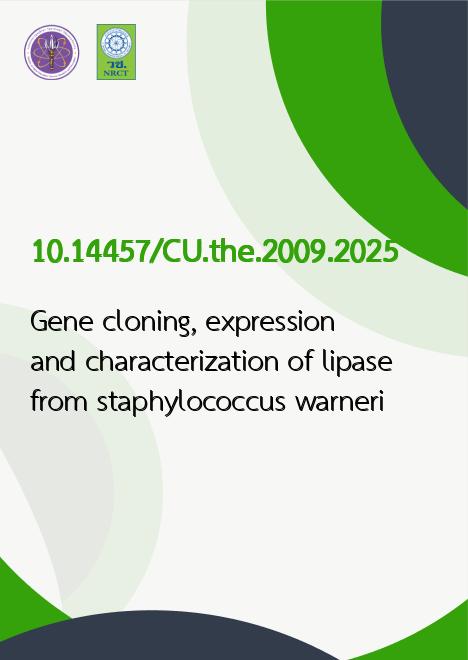
|
Gene cloning, expression and characterization of lipase from staphylococcus warneri |
|---|---|
| รหัสดีโอไอ | |
| Title | Gene cloning, expression and characterization of lipase from staphylococcus warneri |
| Creator | Kaewjai Sangkhaha |
| Contributor | Pakorn Winayanuwattikun |
| Publisher | Chulalongkorn University |
| Publication Year | 2552 |
| Keyword | Lipase, Biodiesel fuels, Molecular cloning, Gene expression, Staphylococcus |
| Abstract | Lipases (triacylglycerol acylhydrolases, E.C. 3.1.1.3) are ubiquitous enzymes that catalyze the hydrolysis of triglycerides to glycerol and free fatty acid. Besides this, they are also efficient in various reactions such as esterification, transesterification and aminolysis in organic solvents. Therefore, these enzymes are nowadays extensively studied for their potential industrial applications. Lipases were found widely in nature, but only microbial lipases are commercially significant. However, natural microbial lipases cannot be sufficiently produced for the industrial applications. Utilizing gene technology, cloning of lipase gene is applied in order to produce large volume of lipase to explore suitable characteristic of lipase such as specificity, stability and application for industrial process. Therefore, the aim of this project is cloning lipase gene from lipase producing bacteria. Both biochemical and genetic tests confirmed that the lipase producing bacterium screened by Biofuel by Biocatalyst Research Unit is Staphylococcus warneri. The lipWY gene of S.warneri was cloned into the plasmid pET-17b producing recombinant plasmid, pET17b-lipWY. The open reading frame of lipWY was composed of 1,053 bp, which encoded 350 amino acids, but the pET17b-lipWY was not expression in Escherichia coli BL21(DE3). A mature lipase gene (gehWA) from S. warneri was also cloned into the plasmid pET-28a producing recombinant plasmid, pET28a-gehWA. The mature gene was composed of 1,140 bp, encoding 379 amino acids. The plasmid was transformed and expressed in E.coli by induction with 0.1M IPTG at 18°C for 5 hr. The expressed recombinant lipase was purified by one step Ni-NTA affinity chromatography yielding 38 folds purity. The 40 kDa purified recombinant lipase was active at pH 8.5 and stable at pH range between pH 8.0-10.0. The lipase exhibited an optimum temperature of 30°C and stable at temperature below 30°C. The substrate specificity study showed that p-nitrophenyl butyrate is a preference of the enzyme. Recombinant lipase is diverse in its sensitivity to solvents but more stable in non-polar than polar organic solvents. The obtained lipase was shown to be activated by the metal ions Ca2+ whereas Zn2+, Hg2+, Ag+ and Co2+ inhibited the enzyme activity. In addition, inhibition was also observed with SDS, EDTA and Tween-80. The purified recombinant lipase could hydrolyze only emulsion of coconut oil as a substrate. However, no detectable fatty acid methyl ester was found in transesterification reaction. This gehWA lipase seems to be proper for application as a biocatalyst in food, pharmaceutical industries and for bioremediation of some pesticides |
| URL Website | cuir.car.chula.ac.th |